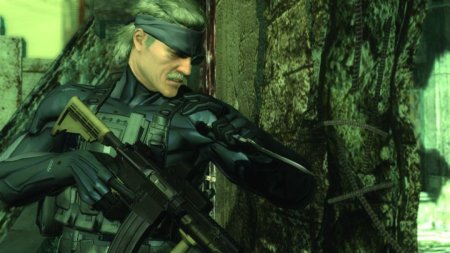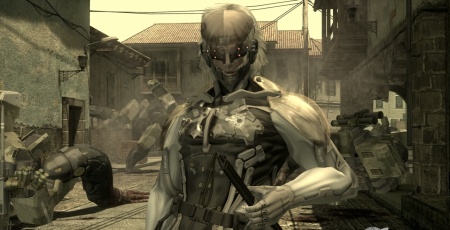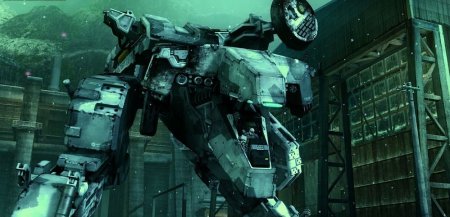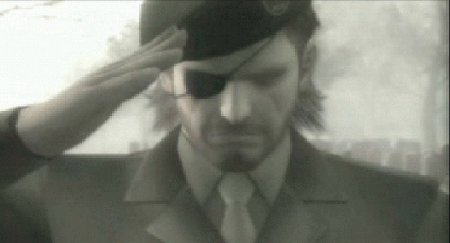I decided to go on a Metal Gear vision quest in preparation for the launch of MGS4. I played all the Solid games in quick succession, then picked up the newest one. Over about a month I was reminded why I loved MGS1, why I loathed MGS2, and, hey, I actually managed to finish MGS3 (most shocking: I actually kind of liked it). Even with all that new-found goodwill, I was still a little iffy about MGS4. The only thing I could say about Kojima is that I have no idea how I feel about the guy. Sometimes you get the impression that he's an idea man. He's the type of guy that can think up the most fantastic worlds you could ever imagine, but you don't always want him sitting in the director's chair.
The guy's probably the most unsubtle director on the planet. That much is obvious from the outset of MGS4. Here, in the first act, a supercharged robot-suited badgirl named Raging Raven flies around a battlefield dropping bombs and shouting “RAGE! RAGE! RAGE! RAGE!” as if she were a Pokémon and that was her catchphrase. There are more badgirls in robots suits, like Laughing Octopus and Crying Wolf. They all have similar name-related mantras. That’s the Kojima artifice in full effect. He has Raging Ravens that scream “RAGE!.” He has Otacon, soft-hearted sidekick who cries whenever anything happens in the plot ever. His main character is an aged super soldier who smokes a pack a day and goes into a coughing fit whenever a scene needs a bit more gravitas.

When I was younger, playing through these games for the first time, I didn’t get it. All I knew was that one night I had to wait for the ending of MGS2 before we could pick up the pizza we ordered. Nearly an hour later MGS2 still wasn’t over. Eventually the pizza guys called to ask if we were still coming (our food was getting cold). Events like that understandably colored my perception of Metal Gear Solid.
Now, after playing all the MGS games again, I think I finally get what the series is about. It’s big and it’s bold. It’s this grand old soap opera. It’s only meant to be taken seriously in so far as Hideo Kojima really thinks it is meant to be taken seriously. I’m probably behind the curve on that, and that’s fine. I’ve learned that Kojima’s not entirely serious, but he’s not exactly Mr. Fancy-Free either. Have you seen his interviews? With that smirk of his and those dorky glasses I can’t help but believe that some portion of him thinks that this Metal Gear thing is the most serious thing that's ever been made.
And it follows that if something's that serious then you shouldn’t mind sitting through thirty minutes of exposition with Big Boss, a guy who's been presumed dead for the entire series, and doesn't even show up until after the end credits. Big Boss repeats silly lines like "That new world is yours to live in... not as a snake, but as a man" for half an hour while you grip the controller and watch. If script has got him saying "you’re no longer a tool now" then following that up with "you’re nobody’s toy" is a little superfluous, and following THAT up with "you’re your own man now" makes you question if the word superfluous has any meaning at all. It keeps coming back to how unsubtle it all is. And my issue isn’t that the dialogue is out of place, this is what we've come to expect from Kojima, but that it makes you miss poignancy of the game’s message.

I picked up Shadow of the Colossus again a few days after playing MGS4. Playing through it, I was immediately reminded of just how subtle games can be. Shadow of the Colossus tells you nothing at the start and continues to tell you nothing throughout the game. Still, it’s possible to infer what’s going on. If you can’t guess at the whole plot, you can at least tell that something isn't quite right.
Metal Gear Solid doesn’t do that, it never has. Metal Gear Solid is in your face. Instead of implying that things aren't right, it will have a character you contact by radio that says “Maybe we’re not on the right path, Snake.” And then Snake replies "Huh? Not on the right path?" (Snake has to answer every statement with a question that includes the full text of that statement). Then your radio contact speaks for five minutes about their favorite philosopher who wrote a lengthy treatise on being on the right path that's shockingly relevant to the situation. That’s the way Kojima writes dialogue. And then there’s you - awash in the middle of it, reading gaming blogs on your laptop because this ten minute conversation got old eight minutes ago. There we are again missing everything that Kojima's trying to say, because he can’t find the words to say it.
The moments that really stand out in Metal Gear, the ones that really matter, are the ones where Kojima doesn’t say anything. The game changes when you walk a half-dead Snake down a hallway of microwave death and the pain is so great he breaks down and starts to crawl. When Snake’s dragging himself on the floor and you’re jamming on the triangle button as hard as you can, his pain is your pain. That’s when Kojima is subtle, even though there’s an idiotic fight scene with a cyborg ninja going on in the picture-in-picture at the top of the screen while the climatic moment plays out. For a second I thought Snake wasn’t going to make it, and it jostled me a little.

The most powerful silent statement Kojima can make comes in Act IV. Here you revisit the abandoned nuclear base on Shadow Moses Island, the setting of the first game, and find all the original Metal Gear Solid's guards have been replaced by robots. Like Snake is an aging soldier, quickly losing his purpose in the world, Act IV is a sharp reflection on the technology of games past. It's brilliant, and nobody has to say "Snake! Don't these robots remind you of the notably stiff and robotic motions of the original guards of this facility?" and Snake doesn't have to reply "Hunh? Original Guards?" for you to get the idea. Without a word Kojima throws into stark contrast his game of 1998 and the game he made today. Then he has to go and spoil it with ten minutes of Drebin, not so much a character as he is exposition personified, explaining how some girl in an armored suit who’d just spent twenty minutes trying to kill me had a childhood so maudlin that it was almost comical, so we can't really blame her for her sociopathic behavior. Really Kojima! She had been trapped in a basement with corpses so long she had to eat the corpses? Is that what passes for good storytelling these days?

When Big Boss takes over Drebin’s exposition duties he goes through a series of worse and worse death throes only barely clinging to life after each coughing fit. After each one he tells Snake that he’s his own man now, or that he’s not in a cage, or that THEY DON’T OWN YOU ANYMORE, MAN. Through all this it’s tough not to roll your eyes and put the controller down and turn to your laptop and go back to reading gaming blogs. But just when you're about to quit is when Big Boss stops talking. He takes a final drag on his cigar and he says just one more thing: this is good... isn’t it? And then he dies. It’s a final death that mars the end of a generation of super soldiers and power players.
In that moment, when the second set of credits start to roll, I’ve forgotten everything I dislike about the Metal Gear Solid series. I’ve forgotten idiotic melodrama with Vamp, with Naomi, with Raging Raven dropping bombs and screaming "RAGE!" All I can remember is the dying soldier’s final acceptance of his obsolescence: this is good... isn’t it?
In that moment, with Big Boss’s final cigar puff, I think maybe Kojima is subtle after all. Maybe Metal Gear Solid is big and bold and stupid as all hell, but maybe it's pretty serious too.